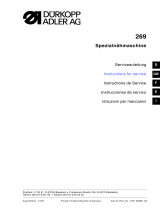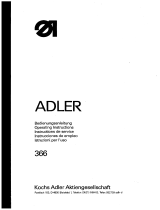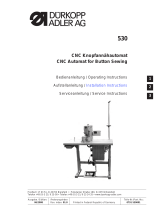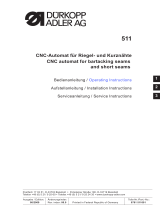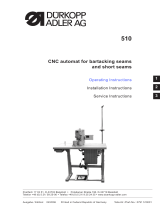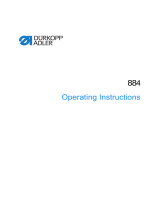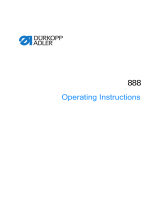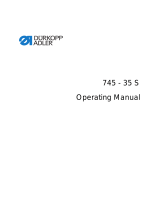Page is loading ...

510
CNC automat for bartacking seams
and short seams
Operating Instructions
Installation Instructions
Service Instructions
Postfach 17 03 51, D-33703 Bielefeld Potsdamer Straße 190, D-33719 Bielefeld
Telefon +49 (0) 5 21/ 59 25-00 Telefax+49(0)521/9252435 www.duerkopp-adler.com
1
2
3
Ausgabe / Edition: 02/2006 Printed in Federal Republic of Germany Teile-Nr.:/Part-No.: 0791 510001

Summary
Operating Instructions
Installation Instructions
Service Instructions
Interconnection-diagram
9890 510001 B

Foreword
This instruction manual is intended to help the user to become familiar
with the machine and take advantage of its application possibilities in
accordance with the recommendations.
The instruction manual contains important information on how to
operate the machine securely, properly and economically. Observation
of the instructions eliminates danger, reduces costs for repair and
down-times, and increases the reliability and life of the machine.
The instruction manual is intended to complement existing national
accident prevention and environment protection regulations.
The instruction manual must always be available at the
machine/sewing unit.
The instruction manual must be read and applied by any person that is
authorized to work on the machine/sewing unit. This means:
– Operation, including equipping, troubleshooting during the work
cycle, removing of fabric waste,
– Service (maintenance, inspection, repair and/or
– Transport.
The user also has to assure that only authorized personnel work on
the machine.
The user is obliged to check the machine at least once per shift for
apparent damages and to immediatly report any changes (including
the performance in service), which impair the safety.
The user company must ensure that the machine is only operated in
perfect working order.
Never remove or disable any safety devices.
If safety devices need to be removed for equipping, repairing or
maintaining, the safety devices must be
remounted directly after completion of the maintenance and repair
work.
Unauthorized modification of the machine rules out liability of the
manufacturer for damage resulting from this.
Observe all safety and danger recommendations on the machine/unit!
The yellow-and-black striped surfaces designate permanend danger
areas, eg danger of squashing, cutting, shearing or collision.
Besides the recommendations in this instruction manual also observe
the general safety and accident prevention regulations!

General safety instructions
The non-observance of the following safety instructions can cause
bodily injuries or damages to the machine.
1. The machine must only be commissioned in full knowledge of the
instruction book and operated by persons with appropriate
training.
2. Before putting into service also read the safety rules and
instructions of the motor supplier.
3. The machine must be used only for the purpose intended. Use of
the machine without the safety devices is not permitted. Observe
all the relevant safety regulations.
4. When gauge parts are exchanged (e.g. needle, presser foot,
needle plate, feed dog and bobbin) when threading, when the
workplace is left, and during service work, the machine must be
disconnected from the mains by switching off the master switch or
disconnecting the mains plug.
5. Daily servicing work must be carried out only by appropriately
trained persons.
6. Repairs, conversion and special maintenance work must only be
carried out by technicians or persons with appropriate training.
7. For service or repair work on pneumatic systems, disconnect the
machine from the compressed air supply system (max. 7-10 bar).
Before disconnecting, reduce the pressure of the maintenance
unit.
Exceptions to this are only adjustments and functions checks
made by appropriately trained technicians.
8. Work on the electrical equipment must be carried out only by
electricians or appropriately trained persons.
9. Work on parts and systems under electric current is not permitted,
except as specified in regulations DIN VDE 0105.
10. Conversion or changes to the machine must be authorized by us
and made only in adherence to all safety regulations.
11. For repairs, only replacement parts approved by us must be used.
12. Commissioning of the sewing head is prohibited until such time
as the entire sewing unit is found to comply with EC directives.
It is absolutely necessary to respect
the safety instructions marked by these signs.
Danger of bodily injuries !
Please note also the general safety instructions.

Index Page:
Part 2: Installation Instructions cl. 510 (DAC III)
1. Scope of delivery.............................................. 3
2. General notes and transport securing devices .......................... 3
3. Mount stand and control circuitry cabinet
3.1 Tabletops................................................... 5
3.2 Mount the stand parts ............................................ 5
3.3 Completethetabletop........................................... 6
3.4 Connect the control box to the main switch ............................... 7
3.5 Mount the reference value transmitter and the potential compensation .............. 8
3.6 Adjustworkingheight............................................ 9
4. Assembly of automatic bartacker
4.1 Mount the oil pan .............................................. 10
4.2 Setuptheautomaticbartacker...................................... 11
4.3 Mount the oil lines .............................................. 12
4.4 Mount the control panel .......................................... 12
4.5 Mount the covering cap .......................................... 13
5. Connect the plug connections to the control box
5.1 Plug connections at the multiple pin strip (4-fold) ........................... 14
5.2 Plug connections at the multiple pin strip (15-fold) .......................... 15
5.3 Cablelaying ................................................. 16
6. Change sew ing feet and fabric support plate............................ 17
7. Fit eye protection ............................................. 18
8. Convert automatic bartacker 510-213 to thick fabrics
8.1 General notes ................................................ 19
8.2 Adjustclampheight............................................. 20
8.3 Change thread wiper ............................................ 20
8.4 Change stop position ............................................ 20
9. Oil lubrication
9.1 Fillupoil ................................................... 21
9.2 Oilwicksandfeltpartintheoilpan ................................... 22
9.3 Oil hook path ................................................. 23
10. Putting into operation
10.1 Standard delivery .............................................. 23
10.2 Softwareinstallationl............................................ 24
10.2.1 General .................................................... 24
10.2.2 Loading the program ............................................ 24
10.2.3 Dongle-Update via internet ........................................ 26
10.3 Sewingtest.................................................. 27
11. Optional equipment
11.1 Sewinglight ................................................. 28
2

2
1. Scope of delivery
What items are supplied dependens on your order.
Please check before the installation whether all required parts are
available.
This description refers to an automatic bartacker the individual
components of which are completely delivered by Dürkopp Adler AG.
–
1 Machine head incl. oil pan
Setofparts“Electro”with:
–
2 Control panel
–
5 Main switch
–
6 DAC control
Dürkopp-Adler accessories with:
–
3 Yarn stand
–
Protection cover (not shown)
–
8 Stand (optional)
–
7 Pedal and bars (optional)
–
4 Table top (optional)
–
9 Drawer (optional)
2. General notes and transport securing devices
ATTENTION !
The automatic bartacker must only be installed by trained
specialist staff.
Transport securing devices
If you have bought an assembled automatic bartacker, the following
transport securing devices have to be removed:
–
Securing tapes and wood battens at machine head, table and
stand.
3

Punch-marks from the
underside (8 x)
Screwed nut (4 x)
from the underside
M6 x 20; observe DIN 7965
4

5
2
3. Mount stand and control circuitry cabinet
3.1 Table tops
The cutouts of self-manufactured table tops must have the dimensions
indicated in the sketch.
Caution: Danger of injury !
The table tops must have the required load-carrying capacity and
strength.
3.2 Mount the stand parts
–
Mount the individual parts of the stand as shown in the illustration.
–
Set the adjusting screw 3 to ensure the stability of the stand.
All four feet of the stand must touch the floor.
–
Screw pedal 2 on the stand strut 1.
–
Align pedal laterally.
Shift the pedal sideways so that it is positioned centrally to the oil pan.
The stand strut is provided with slotted holes for aligning the pedal.
3
2
1

3.3 Complete the table top
–
Place the table top on a worktop upside down.
–
Screw the main switch 6 on the underside of the table top on the
left.
–
Screw cable duct 5 tight behind the main switch 6.
–
Screw cable duct 2 tight to the left of the lead-through 1.
–
Put the access line 4 in the cable duct.
–
Fasten the access line 4 by means of strain relief 3.
–
Place the control box 7 on the underside of the table top and
position it in such a way that the side with the 4 sockets points to
the left (towards the thread reel holder).
–
Screw the control box with four screws on the punch-marked spot
at the underside of the table top.
6
654321
7

3.4 Connect the control box to the main switch
ATTENTION !
Any kind of work on the electric equipment of the automatic bartacker
must be carried out only by electricians or trained personnel.
The mains plug has to be pulled out!
–
Take off the switching k nob 1.
For this purpose loosen the screw 2 in the knob.
–
Remove the cover 3 from the main switch.
For this purpose unlock the locking bar in drill-hole 4 with a
screwdriver.
–
Run the cable from the control box into the cable duct.
–
Insertthecableinthemainswitch.
–
Connect the cable cores of the control box to the
screws ”T1” and “T2”.
–
Connect the protective conductor of the control box in
themainswitch.
–
Put the cover on the line switch again.
–
Put on the switching knob 1 and screw it tight.
–
Put on the cover of the cable duct.
7
2
21 43
5

3.5 Mount the reference value transmitter and the potential compensation
–
Screw the reference value transmitter 5 on the stand strut with
fixing link 1.
–
Hook the ball mugs of the pedal bars 6 in at the pedal and at the
reference value transmitter 5.
–
Screw the potential compensation cable 2 on the fixing link 1.
–
Screw the potential compensation cable 2 of the reference value
transmitter and the potential compensation cable 4 of the
sewing automate tight on the control box by means of screw 3.
8
1
2
3
6
5
4

3.6 Adjust working height
The working height is adjustable between 750 and 950 mm
(measured up to the top edge of the table top).
–
Loosen screws 1 at both legs of the s tand.
In order to prevent twisting, pull out or push in the table
top equally on both sides.
The scales 10 at the exterior surfaces of the legs serve as
adjusting aid.
–
Tighten both screws 1.
9
2
1
2

4. Assembly of automatic bartacker
4.1 Mount the oil pan
–
Lay oil pan 1 on table top 3, align it and screw it tight through the
two through bore-fits 2 with two wood screws.
–
Insert thread reel holder 1 in the drill-hole of the table top and
screw tight with nuts and washers.
Mount and align the thread reel arms and the thread guides.
The thread reel arms and thread guides must be positioned exactly
one above the other.
10
2
3
1

4.2 Set up the automatic bartacker
The small parts for setting up the automatic bartacker are included in
the accessories.
–
Place the automatic bartacker 1 on the oil pan 4.
–
Fasten the automatic bartacker on the left and on the right with the
fixtures 5 and 8.
For this purpose screw the fixtures 5 and 8 tight with the screws 9,
the sheets 11 and the counternuts 10.
–
Insert the machine head support 6 in the drill-hole of the table top.
–
Tilt the automatic bartacker sideways.
–
Run the connecting cables 2 under the table top through the
opening 3.
–
Tilt the automatic bartacker back.
2
11
87 6 5
8
4 321
10
9
9
5
10
11

4.3 Mount the oil lines
–
Fasten the oil lines 8 and 9 in the oil pan by means of fitting 10.
The oil filter must be completely surrounded by the felt.
4.4 Mount the control panel
–
Screw the control panel 4 on the automatic bartacker with angle 3.
Lay rubber washers between the mounting angle of the control
panel and the cast housing.
–
Run the connecting cable 2 under the table top through oil pan 1.
12
10 9 8
4321

4.5 Mount the covering cap
–
Place the covering cap 9 on the retaining spring 10 from above.
–
Lay the cable of the control panel in the gap 1 of the covering cap
before.
–
Screw the covering cap on the automatic bartacker with two screws
through the drill-holes 6 and 8.
13
2
98 6
10
1

5. Connect the plug connections to the control box
5.1 Plug connections at the multiple pin strip (4-fold)
Connect the plug connections of the automatic bartacker as follows:
–
Plug connection 1 è sewing motor plug (four-pole)
–
Plug connection 2 è step motor for the X-drive (five-pole)
–
Plug connection 3 è step motor for the Y-drive (five-pole)
14
1
2
3

5.2 Plug connections at the multiple pin strip (15-fold)
Connect the plug connections of the automatic
bartacker, the control panel and the reference
value transmitter as follows:
–
Plug light barrier /sensor to plug
connection 1 (REF-signals)
Note: The 8-pole plug is encoded.
–
Plug magnets to plug connection 5 (PWM)
Note: The 8-pole plug is encoded.
–
Plug encoder signal sewing motor to plug
connection 2 (encoder sewing motor)
–
Plug control panel to plug connection 3
(control panel)
–
Plug operating elements (pedal switch)
via adapter 6 to plug connection 4
(I/O 1-8)
2
15
5
6
1
2
3
4

5.3 Cable laying
To make the tilting of the machine head possible, the cables leading
from the head through the opening in the table top to either the multiple
pin strip (15-fold) at the control box and to the c able duct must be long
enough. For this purpose the cables must be laid to form an arc 2 with
the help of cable ties.
16
2

6. Change sewing feet and fabric support plate
The automatic bartacker 510 is delivered with a standard sewing
equipment.
If you have received a further optional sewing equipment, this has to
be mounted as follows:
Caution: Danger of injury !
Switch off main switch.
Change sewing equipment only when main switch is switched off.
Disassemble sew ing equipment
–
Unscrew screws 3.
–
Pull off holder 5.
–
Take out sewing feet 4 and 6.
–
Unscrew screw 1.
–
Take off s upport plate 2.
Assemble sew ing equipment
–
Insert sewing feet 4 and 6.
–
Place retainer plate 5 and screw tight with screws 3.
–
Place support plate 2 and screw tight with screw 1.
ATTENTION Risk of breakage !
When changing the clamping foot enter without fail the new clamping
foot number in the menu “Equipment“.
2
17
21
36543
/


